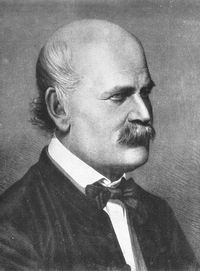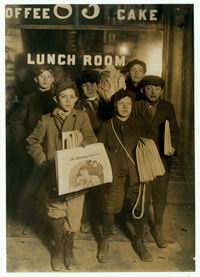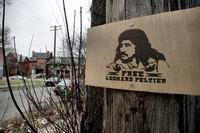|
|
Seeds of Fire: A People’s Chronology
Recalling events that happened on this day in history.
Memories of struggle, resistance and persistence.
Compiled by Ulli Diemer
|
July 1, 965
|
|
|
Birth of Abu Ali al-Hasan ibn alHasan ibn al-Haytham (Alhazen), in Basra, scientist, polymath, mathematician, astronomer and philosopher. His books, written in Arabic, are translated into Latin, Hebrew, and other languages, and are important influence on the work of Islamic and European scientists.
|
|
July 1, 1818
|

|
|
Birth of Ignaz Semmelweis (1818-1865), physician and medical pioneer. Semmelweis proposes the radical idea that physicians assisting at childbirth should first disinfect their hands; he believes this will greatly reduce the incidence of puerperal fever, a leading cause of death for women giving birth. Semmelweis comes to this idea upon observing that women giving birth at home had a significantly lower incidence of puerperal fever than women giving birth in hospitals. At the time, it was common practice for physicians to go straight from treating ill patients, or dissecting a cadaver, to a woman giving birth.
Semmelweis’ idea is fiercely opposed by the medical establishment, and Semmelweis himself is ostracized. One leading obstetrician and medical educator sums up the common attitude in his statement: “Doctors are gentlemen, and gentlemen’s hands are clean.”
In 1865, Semmelweis is forcibly confined to a mental institution, where he is tortured and beaten. He dies within days as a result of his injuries.
After his death, his ideas are found to be correct, and universally adopted.
|
|
July 1840
|
|
|
American naval forces attack Fiji islanders to punish them for interfering with the American surveying parties who have landed on the islands. The islanders have been resisting the surveys because they know the U.S. intends to seize the land being surveyed.
|
|
July 1847
|
|
|
Middle-class reformers in France start holding banquets to circumvent a ban on political meetings. The ‘campaign of banquets’ provides an outlet for political criticism of the regime. The campaign continues until all banquets are outlawed in February 1848.
|
|
July 1899
|

|
|
The Newsboys Strike of 1899. Newspaper boys in New York are responsible for distributing newspapers to the public, standing on street corners and walking the streets hawking newspapers for sale. Most of them exist in conditions of extreme poverty; many live on the streets. The newspapers treat them as independent contractors rather than employees; the boys are made to buy the newspapers they sell, and are not allowed to return unsold copies.
After the New York World and the New York Morning Journal, owned by Joseph Pulitzer and William Randolph Hearst, increase the amount the boys have to pay for each newspaper, a large number of newsboys agree to stop selling the World and the Journal.
The strikers demonstrate on the Brooklyn Bridge, bringing traffic to a halt, and hold large rallies with up to 5,000 newsboys. The newspaper owners resort to violence to try to break the strike.
Eventually the newspaper owners give in on one of the boys’ key demands: they agree to buy back unsold newspapers, and the strike ends.
|
|
July 1, 1923
|
|
|
During a steelworkers’ strike in Cape Breton Island, Nova Scotia, in the summer of 1923, mounted provincial police brutally attack a crowd of women and children in what becomes known as Bloody Sunday.
|
|
July 1933
|
|
|
The newly formed Co-operative Commonwealth Federation (CCF) holds its convention in Regina, Saskatchewan, and adopts the Regina Manifesto.
The manifesto is an attempt to reconcile the views of the different elements that have come together to form the CCF: labour organizations, farmers, Christian socialists, and social-democratic intellectuals. It calls for socialization of banks and key industries in the transportation, communications, and electrical sectors, and proclaims that “No C.C.F. Government will rest content until it has eradicated capitalism and put into operation the full programme of socialized planning which will lead to the establishment in Canada of the Cooperative Commonwealth.”
However, the programme it lays out, emphasizing top-down reforms to bring about a planned economy, reflects a social-democratic vision of gradual evolutionary change, not a vision of fundamental change brought about by a mass movement.
|
|
July 1, 1935
|
|
|
RCMP and local police attack a public meeting to support the On-to-Ottawa Trek in Regina. The Trekkers, unemployed men protesting dismal conditions in federal relief camps, are heading east to Ottawa to present their grievances to the federal government. Hundreds of trekkers and supporters are injured in the police attack; at least one dies later from his injuries. Hospital records are subsequently altered to conceal the cause of injuries and death.
The city’s exhibition grounds, where the Trekkers are staying, are surrounded by police armed with revolvers and machine guns who erect barbed wire, and prevent any food or water from being brought in.
Saskatchewan Premier Gardiner sends a telegram to Prime Minister Bennett accusing the police of “instigating a riot” and asking that the men be fed and allowed to leave; Bennett agrees. The events help to discredit Bennett’s Conservative government, which is defeated in the election later that year.
|
|
July 1, 1962
|
|
|
The Saskatchewan Medical Care Insurance Bill, providing universal medical insurance, comes into effect. The medical profession reacts with horror: most doctors go on strike. The CCF government responds by bringing in doctors from Britain and the United States, and setting up community health centres. The strike fails; less than a month later most doctors have returned to work. By 1965, polls show that most doctors, as well as the public, like the medicare program.
|
|
July 1, 1977
|

|
|
Native activist Leonard Peltier is convicted – despite a lack of evidence – in the deaths of two FBI agents who were engaged in an attack on an American Indian Movement encampment. He still remains in jail, one of the longest-imprisoned political prisoners in the world.
|
|
July 1997
|
|
|
Financial speculators trigger a major international capitalist crisis when they launch a speculative attack on the currency of Thailand. The Thai currency collapses, and what quickly becomes the Asian financial crisis spreads to Indonesia and South Korea, as well as to Hong Kong, Malaysia, Laos and the Philippines. The International Monetary Fund steps in and forces affected governments to cut spending on social services in order to bail out the banks.
|
|
For more information about people and events in Seeds of Fire, explore these pages:
|
|
|
|
|
|

